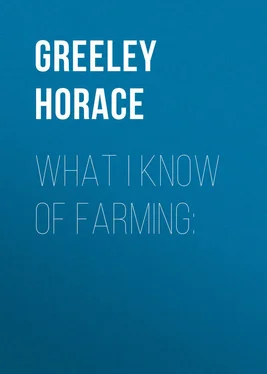Horace Greeley - What I know of farming:
Здесь есть возможность читать онлайн «Horace Greeley - What I know of farming:» — ознакомительный отрывок электронной книги совершенно бесплатно, а после прочтения отрывка купить полную версию. В некоторых случаях можно слушать аудио, скачать через торрент в формате fb2 и присутствует краткое содержание. Жанр: foreign_antique, foreign_prose, foreign_language, на английском языке. Описание произведения, (предисловие) а так же отзывы посетителей доступны на портале библиотеки ЛибКат.
- Название:What I know of farming:
- Автор:
- Жанр:
- Год:неизвестен
- ISBN:нет данных
- Рейтинг книги:4 / 5. Голосов: 1
-
Избранное:Добавить в избранное
- Отзывы:
-
Ваша оценка:
- 80
- 1
- 2
- 3
- 4
- 5
What I know of farming:: краткое содержание, описание и аннотация
Предлагаем к чтению аннотацию, описание, краткое содержание или предисловие (зависит от того, что написал сам автор книги «What I know of farming:»). Если вы не нашли необходимую информацию о книге — напишите в комментариях, мы постараемся отыскать её.
What I know of farming: — читать онлайн ознакомительный отрывок
Ниже представлен текст книги, разбитый по страницам. Система сохранения места последней прочитанной страницы, позволяет с удобством читать онлайн бесплатно книгу «What I know of farming:», без необходимости каждый раз заново искать на чём Вы остановились. Поставьте закладку, и сможете в любой момент перейти на страницу, на которой закончили чтение.
Интервал:
Закладка:
VIII.
GROWING TIMBER – TREE-PLANTING
In my judgment, the proportion of a small farm that should be constantly devoted to trees (other than fruit) is not less than one-fourth; while, of farms exceeding one hundred acres in area, that proportion should be not less than one-third, and may often be profitably increased to one-half. I am thinking of such as are in good part superficially rugged and rocky, or sandy and sterile, such as New-England, eastern New-York, northern New-Jersey, with both slopes of the Alleghenies, as well as the western third of our continent, abound in. It may be that it is advisable to be content with a smaller proportion of timber in the Prairie States and the broad, fertile intervales which embosom most of our great rivers for at least a part of their course; but I doubt it. And there is scarcely a farm in the whole country, outside of the great primitive forests in which openings have but recently been made, in which some tree-planting is not urgently required.
"Too much land," you will hear assigned on every side as a reason for poor farming and meager crops. Ask an average farmer in New-England, in Virginia, in Kentucky, or in Alabama, why the crops of his section are in the average no better, and the answer, three times in four, will be, "Our farmers have too much land" – that is, not too much absolutely, but too much relatively to their capital, stock, and general ability to till effectively. The habitual grower of poor crops will proffer this explanation quite as freely and frequently as his more thrifty neighbor. And what every one asserts must have a basis of truth.
Now, I do not mean to quarrel with the instinct which prompts my countrymen to buy and hold too much land. They feel, as I do, that land is still cheap almost anywhere in this country – cheap, if not in view of the income now derived from it, certainly in contemplation of the price it must soon command and the income it might, under better management, be made to yield. Under this conviction – or, if you please, impression – every one is intent on holding on to more land than he can profitably till, if not more than he can promptly pay for.
What I do object to is simply this – that thousands, who have more land than they have capital to work profitably, will persist in half-tilling many acres, instead of thoroughly farming one-half or one third so many, and getting the rest into wood so fast as may be. I am confident that two-thirds of all our farmers would improve their circumstances and increase their incomes by concentrating their efforts, their means, their fertilizers, upon half to two-thirds of the area they now skim and skin, and giving the residue back to timber-growing.
In my own hilly, rocky, often boggy, Westchester – probably within six of being the oldest Agricultural County in the Union – I am confident that ten thousand acres might to-morrow be given back to forest with profit to the owners and advantage to all its inhabitants. It is a fruit-growing, milk-producing, truck-farming county, closely adjoining the greatest city of the New World; hence, one wherein land can be cultivated as profitably as almost anywhere else – yet I am satisfied that half its surface may be more advantageously devoted to timber than to grass or tillage. Nay; I doubt that one acre in a hundred of rocky land – that is, land ribbed or dotted with rocks that the bar or the rock-hook cannot lift from their beds, and which it will not as yet pay to blast – is now tilled to profit, or ever will be until it shall be found advisable to clear them utterly of stone breaking through or rising within two feet of the surface. The time will doubtless arrive in which many fields will pay for clearing of stone that would not to-day; these, I urge, should be given up to wood now, and kept wooded until the hour shall have struck for ridding them of every impediment to the steady progress of both the surface and the subsoil plow.
Were all the rocky crests and rugged acclivities of this County bounteously wooded once more, and kept so for a generation, our floods would be less injurious, our springs unfailing, and our streams more constant and equable; our blasts would be less bitter, and our gales less destructive to fruit; we should have vastly more birds to delight us by their melody and aid us in our not very successful war with devouring insects; we should grow peaches, cherries, and other delicate fruits, which the violent caprices of our seasons, the remorseless devastations of our visible and invisible insect enemies, have all but annihilated; and we should keep more cows and make more milk on two-thirds of the land now devoted to grass than we actually do from the whole of it. And what is true of Westchester is measurably true of every rural county in the Union.
I have said that I believe in cutting trees as well as in growing them; I have not said, and do not mean to say, that I believe in cutting everything clean as you go. That was once proper in Westchester; it is still advisable in forest-covered regions, where the sun must be let in before crops can be grown; but, in nine cases out of ten, timber should be thinned or culled out rather than cut off; and, for every tree taken away, at least two should be planted or set out.
We have pretty well outgrown the folly of letting every apple-tree bear such fruit as it will; though in the orchard of my father's little farm in Amherst, N. H., whereon I was born, no tree had ever been grafted when I bade adieu to it in 1820; and I presume none has been to this day. By this time, almost every farmer realizes that he can't afford to grow little, gnarly, villainously sour or detestably bitter-sweet apples, when, by duly setting a graft at a cost of two dimes, he may make that identical tree yield Greenings or Pippins at least as bounteously. I presume the cumulative experience of fifty or sixty generations of apple-growers has ripened this conclusion. Why do they not infer readily and generally that growing indifferent timber where the best and most valued would grow as rapidly, is a stupid, costly blunder? It seems to me that whoever has attained the conviction that apple-trees should be grafted ought to know that it is wasteful to grow Red Oak, Beech, White Maple, and Alder, where White Oak, Hickory, Locust, and White Pine, might be grown with equal facility, in equal luxuriance, provided the right seeds were planted, and a little pains taken to keep down, for a year or two, the shoots spontaneously sent up by the wrong ones.
North of the Potomac, and east of the Ohio, and (I presume) in limited districts elsewhere, rocky, sterile woodlands, costing $2 to $50 per acre according to location, etc., are to-day the cheapest property to be bought in the United States. Even though nothing were done with them but keep out fire and cattle, and let the young trees grow as they will, money can be more profitably and safely invested in lands covered by young timber than in anything else. The parent, who would invest a few thousands for the benefit of children or grandchildren still young, may buy woodlands which will be worth twenty times their present cost within the next twenty years. But better even than this would it be to buy up rocky, craggy, naked hill-sides and eminences which have been pastured to death, and, shutting out cattle inflexibly, scratch these over with plow, mattock, hoe, or pick, as circumstances shall dictate, plant them thickly with Chestnut, Walnut, Hickory, White Oak, and the seeds of Locust and White Pine. I say Locust, though not yet certain that this tree must not be started in garden or nursery-beds and transplanted when two or three years old, so puny and feeble is it at the outset, and so likely to be smothered under leaves or killed out by its more favored neighbors. I have experiments in progress not yet matured, which may shed light on this point before I finish these essays.
Читать дальшеИнтервал:
Закладка:
Похожие книги на «What I know of farming:»
Представляем Вашему вниманию похожие книги на «What I know of farming:» списком для выбора. Мы отобрали схожую по названию и смыслу литературу в надежде предоставить читателям больше вариантов отыскать новые, интересные, ещё непрочитанные произведения.
Обсуждение, отзывы о книге «What I know of farming:» и просто собственные мнения читателей. Оставьте ваши комментарии, напишите, что Вы думаете о произведении, его смысле или главных героях. Укажите что конкретно понравилось, а что нет, и почему Вы так считаете.












